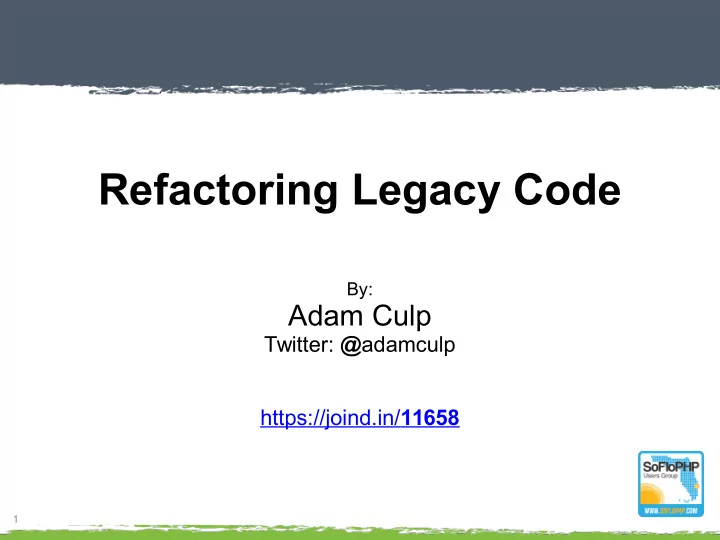

Refactoring Legacy Code By: Adam Culp Twitter: @ adamculp https://joind.in/ 11658 1
Refactoring Legacy Code ● About me PHP 5.3 Certified – Consultant at Zend Technologies – Zend Certification Advisory Board – Organizer SoFloPHP (South Florida) – Organized SunshinePHP (Miami) – Long distance (ultra) runner – Judo Black Belt Instructor – 2
Refactoring Legacy Code ● Fan of iteration Pretty much everything requires iteration to do well: – Long distance running ● Judo ● Development ● Evading project managers ● Refactoring! ● 3
Refactoring Legacy Code ● Refactoring “Refactoring; Improving The Design of Existing Code” book, by Martin – Fowler. https://github.com/adamculp/refactoring101 – for PHP code samples – 4
Refactoring Legacy Code ● My book “Refactoring 101” on LeanPub. – http://refactoring101.com – 5
Refactoring Legacy Code ● Modernizing “Modernizing Legacy Applications in PHP” on LeanPub – by Paul M. Jones – http://mlaphp.com – 6
Refactoring Legacy Code ● What is “refactoring”? “...process of changing a computer program's source code without – modifying its external functional behavior...” en.wikipedia.org/wiki/Refactoring No functionality added – Code quality – 7
Refactoring Legacy Code ● Two hats Adding Functionality Hat – Refactoring Hat – We add functionality, then refactor, then add more functionality ... – 8
Refactoring Legacy Code ● Then optimize Do not optimize while refactoring. – Separate step. – Refactoring is NOT optimizing. – 9
Refactoring Legacy Code ● Source Control Refactor in branch – Allows rollback – 10
Refactoring Legacy Code ● Editor/IDE Files by project – Search within project – 11
Refactoring Legacy Code ● Style Guide Framework Interop Group – ● http://php-fig.org ● PSR Faster reading – United team – 12
Refactoring Legacy Code ● Testing Consistent results – Prevents breaks – 13
Refactoring Legacy Code ● Autoloading Namespaces – PSR-0 – ● Because legacy code typically used long class names rather than namespace separators. Methods – ● Global function ● Closure ● Static or Instance Method (preferred, if possible) ● __autoload() - PHP v 5.0 Need a central place for classes – 14
Refactoring Legacy Code ● Consolidate Classes Move to one location – ● Could be named “includes”, “classes”, “src”, “lib”, etc. Search for include statements (include, include_once, require, require_once) – 15
Refactoring Legacy Code ● Consolidate Classes Step 1 Search for include statements (include, include_once, require, – require_once) 16
Refactoring Legacy Code ● Consolidate Classes Step 2 17
Refactoring Legacy Code ● Consolidate Classes Step 3 User class is now autoloaded, no more require_once. – 18
Refactoring Legacy Code ● Global Dependencies Search for global reference 1 Move global calls to constructor 2 Convert call to a constructor parameter 3 Update call to class to pass parameter (DI) 4 Repeat 5 19
Refactoring Legacy Code ● Global Use Example 20
Refactoring Legacy Code ● Global Cleanup Step 1 Move global call to constructor – 21
Refactoring Legacy Code ● Global Cleanup Step 2 Convert call to a constructor parameter – 22
Refactoring Legacy Code ● Global Cleanup Step 3 Update call to class to pass parameter (DI) – 23
Refactoring Legacy Code ● Global Cleanup Repeat Look for more instances to clean up – 24
Refactoring Legacy Code ● Replacing “new” Extract instantiation to constructor parameter. (one time) 1 Extract block of creation code to new Factory class. (repeated) 2 Update instantiation calls 3 Repeat 4 25
Refactoring Legacy Code ● Replacing “new” Step 1 (Single) 26
Refactoring Legacy Code ● Replacing “new” Step 2 (Single) Pass Db object into class constructor. (DI) – 27
Refactoring Legacy Code ● Replacing “new” Step 3 (Multiple) 28
Refactoring Legacy Code ● Replacing “new” Step 4 (Multiple) Create factory – 29
Refactoring Legacy Code ● Replacing “new” Step 5 (Multiple) 30
Refactoring Legacy Code ● Replacing “new” Step 6 (Multiple) 31
Refactoring Legacy Code ● Write Tests Code is fairly clean – Write tests for entire application – If not testable, refactor – ● Extract method ● Replace temp with query ● Etc. 32
Refactoring Legacy Code ● Extract SQL Search for SQL 1 Move statement and relevent logic to Gateway class 2 Create test for new class 3 Alter code to use new method 4 Repeat 5 33
Refactoring Legacy Code ● Extract Logic Search for uses of Gateway class outside of Transaction classes 1 Extract logic to Transaction classes 2 Test 3 Write new tests where needed 4 Repeat 5 34
Refactoring Legacy Code ● Replace “includes” Search for left over includes – If in current class – Copy contents into file directly 1 Refactor for: no globals, no 'new', DI, return instead of output, no includes 2 More often – Copy contents of include as-is to new class method 1 Replace with in-line instantiation 2 Search for other uses of same, and update them as well 3 Delete original include file, regression test 4 Test, create new tests if needed – Repeat – 35
Refactoring Legacy Code ● Framework Code is able to be upgraded to framework – Create models – Create factories – Create modules – Move models & factories – Create/Update tests – Create controllers and views – Add service – Use events – Use 3 rd party (vendor) libraries – 36
Refactoring Legacy Code ● Conclusion Do not refactor a broken application – Always have tests in place prior to refactor – ● Unit tests or ● Functional tests or ● Manual tests Do things in small steps – Love iteration! – 37
● Thank you! Please rate at: https://joind.in/11658 – Adam Culp http://www.geekyboy.com Twitter @adamculp Questions?
Recommend
More recommend